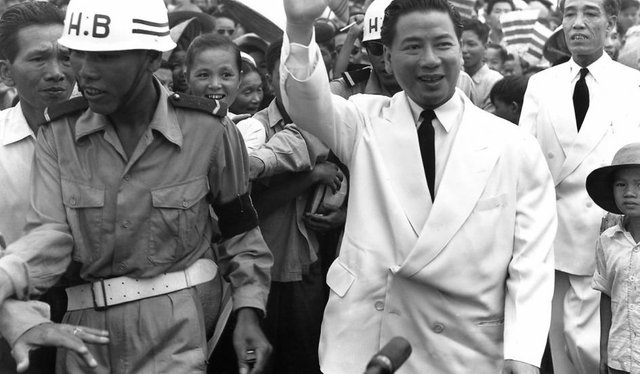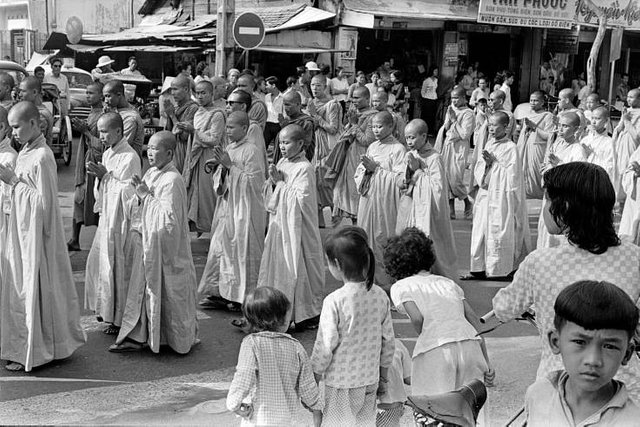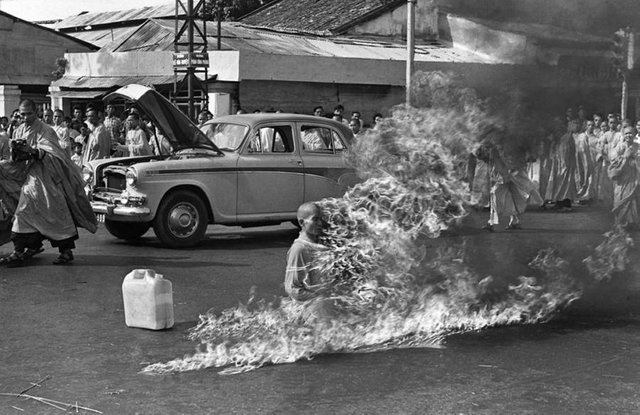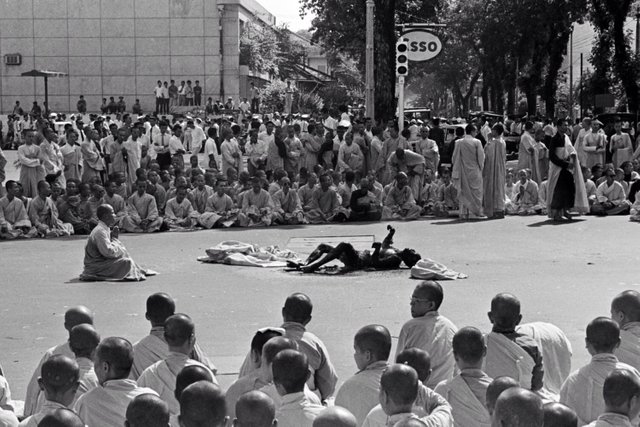Freedom of Thought: The Burning Monk - Forgotten Freedom Fighters

I chose several weeks ago to do the next Forgotten Freedom Fighters post about “The Burning Monk.” Like so many others, I did not know the short story about the picture of a South Vietnamese Buddhist monk. The picture for me conjured up images from the Vietnam War, and the peace movement in America. I mistakenly thought that his protest was made in relation to war. “The Burning Monk,” Thich Quang Duc, was certainly protesting government, force, and violence. The purpose behind his act was not war, it was religion. One of the most horrific displays of government evil is the way it uses religion to control. Freedom of religion is essential. What we believe and think must be free.
The First Amendment to the United States Constitution reads, “Congress shall make no law respecting an establishment of religion, or prohibiting the free exercise thereof; or abridging the freedom of speech; or the press; or the right of the people peaceably to assemble, and to petition the Government for a redress of grievances.” So many times, those who talk about this statement look at particular parts. They talk about freedom of religion, or free speech, ect. I think it is important to look at it as a whole.
As an activist, I want to make this about the right to protest. The Burning Monk certainly protested. It is my belief that this amendment goes much deeper than that and so does the actions of this brave monk in Saigon on May 8th, 1963. His statement is that he was willing to die so that others could think what they willed. Our minds and the exercise of that mind, whether in what we believe, what we say, how those thoughts are given to the world, who we gather to discuss them with, or finally, the right to stand up to those who would control our thoughts, is essential. The first amendment’s purpose is to protect our right to ideas and the free exchange of those ideas. Without this freedom, all progress stops, and all other freedoms are destroyed.
Religion is certainly one of the best avenues for thoughts to be exchanged. In my studies, I find that those who deeply think about religion also tend to deeply think about liberty. This was certainly true of the founding fathers of this country. Many of them were deeply religious; that is clear by reading almost any of them. What is also clear is that they were not of one religious voice. Catholics, a variety of Protestant religions, and a huge influence from Deism, all had a voice. They all agreed that the freedom to think needed to be protected. People, like Patrick Henry, felt that the Constitution did not go far enough to ensure freedom. Henry suggested that in the body of the Constitution be included a bill of rights that had 40 individual protected statements. The first ten amendments were a compromise.

In South Vietnam, in 1963, it was a crime to publicly practice Buddhism. You were not even allowed to display a Buddhist flag. This was in a country where 90% of the populace was Buddhist. The government under the leadership of its president, Ngo Dinh Diem, was forcing Catholicism on the people. Diem had decided that the people were not free to think.
To contrast the prohibition against Buddhist thought, Diem had encouraged the waving of Vatican flags for a celebration of his brother, who was a Catholic archbishop. When the Buddhists reacted by pouring into the streets with their own flag, the police were called to put down the protest. The people continued to resist and the army was called in with armored personnel carriers.
The army opened fire on the peaceful protesters. The crowd of around 500 people was dispersed, leaving 9 people dead, 2 of which were children who the government’s military had crushed to death under the wheels of those personnel carriers for doing nothing but having a belief and gathering to bring grievances to their government. Also, put into perspective, this occurred on Phat Dan, a Buddhist holiday which celebrates the birthday of Gautma Buddha.

In reaction to the murder of these people, the Buddhists issued demands for religious equality and justice for the dead. These peaceful people wanted no more than to practice their religion and discuss ideas. We also should consider that Buddhism itself teaches peace and encourages individual thought.
Thich Quang Duc started his religious path at the age of 9. By the time he was 20, he had become a full fledged monk. He spent three years living as a “Holy Hermit” in the mountains of Vietnam completely isolated.
On June 11th, 1963, Thich Quang Duc entered a busy intersection, followed by 350 monks and nuns, in the capital of South Vietnam, Saigon. He quietly sat down on a cushion in the center of the road and assumed the position of meditation that he had made thousands of times before in his religious practice. Another monk retrieved a 5 gallon can of petroleum from a car. This devoted monk continued in deep meditation while the gasoline was poured all over his body and around him. He continued to rotate his beads and chant.

Unknown to onlookers, this monk had a match in his hand. As the last words of his prayer left his mouth he struck the match, and in a moment he was completely swallowed up in flame. The Burning Monk never moved a muscle or flinched in pain. No words, screams, or as much as a gasp left his mouth. In a moment, this man who had devoted his life to his religious ideas had died for them, and had held true to his anti-violent teachings. He ascended not only into history books, but more importantly into his vision of heaven as a martyr for freedom of religion and thought. He was a saint.
As the authorities tried to get to him and put out the fire, Duc’s brother monks laid down in front of the wheels of the fire department and stopped them. When the fire died, his brothers covered his burnt body in yellow robes, laid him in a casket, and took him back to their Buddhist temple, called a pagoda.
The Burning Monk had entered that street with 350 people; he left with more than a thousand. Even police officers left their post to honor this man. I cannot imagine seeing this. The video and pictures from this, which had to be snuck out of the country, are moving. To see it, must have been spiritually profound. When they arrived at the pagoda they finished his cremation.

During the cremation the police surrounded the pagoda. They swarmed the holy place and this funeral with rifles, riot gear, and armored vehicles. The police dragged 36 monks out and arrested them. The charge they eventually faced was, holding a prayer meeting on the street. They were arrested for having prayer.
They were too late. The film had already been smuggled out of the country and would appear in newspapers all over the world. The reaction of the South Vietnamese government was sickening. The president’s sister-in-law joked that she would “clap hands at seeing another barbecue show.” Diem sent Special Forces units into the pagoda to retrieve the remains of the monk. They left with only the miraculously unburned heart. This would eventually lead to the president of South Vietnam being overthrown by a revolt. With one single match, Thich Quang Duc took down a tyrannical government.
Thought is sacred and is a natural right. Exchanging those thoughts is how we as a species evolve socially. The Burning Monk was a man of peace. There is no doubt about his devotion to his ideas. Life is also precious and should be valued. As with many of the freedom fighters I have covered, Thich Quang Duc took a stand at a time where extreme action was needed. When I wrote the article on Geronimo, I was mindful that he had taken up arms to fight tyranny and I feel as though in this time, more peaceful methods are necessary. With the Burning Monk, I respect and uplift this man as who he was, a brave freedom fighter. His statement has been made and hopefully will never need repeated.
By @marcus.pulis (Press Secretary)
Wow, this is so heart taking and warming. Your article is really well-written and well structured. I didn't just enjoy reading it, but it also had me shook about the story of The Burning Monk.
Thank you for this post. I loved reading it!
And while I am baffled and not sure how to put down a relevant comment, I just reminded myself, that there are a lot of people out there who are going through other kinds of selfless sacrifices, although they are the ones who are truly suffering, but endure and keep on with the selflessness they have in their hearts to reach out to those who are on the wrong path.
Thank you, this post was difficult to write. The emotions captured in the videos and pictures alone were moving. I came away with a feeling that although I think what he did was acheive enlightenment, I am blessed to live in a world that has come so far in a relatively short period of time.
And we came to the aide of this fascist monster? I guess it's Ok to engage in atrocities if you are a "friend" of the United States, but not if they declare you an enemy. What hypocrisy.
So many things I want to write but none of them seem too be any good..........
I give you the reason in your thoughts of freedom in the era of Thich Quang Duc in the 60's did not excist the right of free expression the government controlled the people at will in the current era there is a little more freedom of expression in comparison with the 60's .
We are all free to think what we want, we are free to discuss what is wrong with the government. We can criticize that this is not working in our country and in which the government is failing. Freedom of expression is everyone's right ... it hurts that monk Thich Quang Duc lived in a different "epoch" to ours.
In the current religion theme, every human being is free to decide which religion he wants to follow in the 60's. The Catholic religion had a lot of influence in the decisions of the governments; At present, the Catholic religion does not have the same weight as before.
"If you can feel that staying human is worthwhile, even when it can't have any result whatever, you've beaten them."
-George Orwell
Thanks for posting this story @adamkokesh and reminding us of forgotten freedom fighters.
Thank you
Look - to how barbaric, reasonless, pointless and cannibalistic moves religion can push human beings.
Clearly this wasn't what the author was aiming at when he wrote this post...
I have no problem with people protesting but wouldnt it be far more effective for organized 24 hour protests with half hour shifts at politicians' homes/masonic lodges. The protestors all dress like secret service or wear masks to protect their identity.
as you stated down below, the protestors get round up like cattle. Looking more dangerous, would be another reason for the special forces to put violence to use and justify their actions.
If a totalitarian government assumes that they aren't at fault but those protesting, especially in front of the politicians homes, wouldn't stop them from using violence, as they are the ones who are ruling and the mass are the ones who need to submit to the agenda.
Protesting in designated "free speech zones" simply allows the cops to round us all up like cattle (which is what freemasons refer to the public as "cowan") Yes we are literally cattle to them.